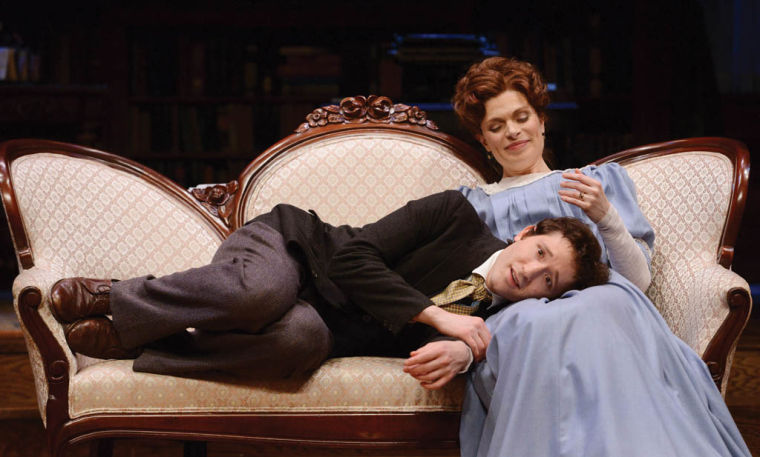‘Candida’ strives to bring classic comedy to young audiences
April 17, 2014
Katie Conway doesn’t see how college-aged audiences could turn down a weekend trip to the theater, especially when its costs rival another weekend staple.
“It’s fifteen dollars to come see a show,” said Conway, group sales and audience development manager at the Pittsburgh Public Theater. “It’s cheaper than a pizza.”
“Candida,” the latest pizza-priced production at the O’Reilly Theater in Downtown, will debut tonight and run through May 18. Ted Pappas, who is in his 14th season as producing artistic director at the Pittsburgh Public Theater, directs the classic British comedy, which George Bernard Shaw wrote in 1894.
The play focuses on one day in a romantic tug-of-war between two men bidding for the heart of the titular character (Gretchen Egolf). Candida is married to a well-respected pastor, James Morell (David Whalen), but she’s still courted by Eugene Marchbanks (Jared McGuire), an affectionate poet.
The play’s humor and themes of love, Pappas said, are what primarily make “Candida” appealing to a younger audience.
“I think if you gave a copy of the play to kids, some would respond to it,” McGuire said. “But to see it and to see how much passion is in this play, and if there’s anything that kids can respond to — or young people in general — it’s unrestrained desire.”
Conway hopes that these themes, coupled with special discounts for Pitt students, draw a younger audience to the show. Pitt students can receive a discounted $15.75 ticket, which could regularly cost up to $60, for any show when they present their Pitt IDs.
“Getting young people in the theater and making it accessible to them, especially from a price point, is a priority of ours,” Conway said.
McGuire views his character as the perfect foil to Candida’s more straitlaced husband.
“He’s just a poet and a dreamer,” McGuire said. “He doesn’t want to go back to school. He just wants to lie around and dream.”
Eugene, after being taken in by Candida and her husband, falls in love with his hostess even though his feelings aren’t necessarily reciprocated.
“The love triangle is more of a Bermuda triangle. It doesn’t really exist in a sense,” McGuire said. “The triangle, if there is one, comes about because Eugene is very deftly able to put a seed of doubt in Morell’s mind after he pronounces his own love for Candida.”
Pappas argues that Candida is a true masterpiece with themes and humor that transcend its age.
“It’s still funny and exciting because the subjects he writes about and the arguments he makes and the jokes he makes still matter today … [and] are still interesting and funny,” Pappas said.
Pappas said that Shaw’s development of Candida’s character as an intelligent and influential woman is particularly groundbreaking, considering the time period in which the play was written.
“This is a play whose leading lady, whose heroine, the title character, is a woman who isn’t even allowed to vote, who really isn’t allowed to hold a position in commerce or in medicine or at a university. And yet, she is incredibly intelligent and incredibly capable,” Pappas said.
While there are two primary male characters, Candida subtly steals the spotlight — and power — from them.
“He has in his play a capitalist, a parson and a poet — three extremes of life — but none of them are the bad guy. They’re all necessary for a society to keep moving forward. At the center of it he has a woman, who seems to be lurking in the background, but is truly ruling.”








